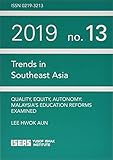Quality, Equity, Autonomy : Malaysia's Education Reforms Examined / Hwok Aun Lee.
Material type: TextPublisher: Singapore : ISEAS Publishing, [2019]Copyright date: ©2019Description: 1 online resource (36 p.)Content type:
TextPublisher: Singapore : ISEAS Publishing, [2019]Copyright date: ©2019Description: 1 online resource (36 p.)Content type: - 9789814881173
- 9789814881180
- Internet Access AEU
- online - DeGruyter
- Issued also in print.
| Item type | Current library | Call number | URL | Status | Notes | Barcode | |
|---|---|---|---|---|---|---|---|
 eBook
eBook
|
Biblioteca "Angelicum" Pont. Univ. S.Tommaso d'Aquino Nuvola online | online - DeGruyter (Browse shelf(Opens below)) | Online access | Not for loan (Accesso limitato) | Accesso per gli utenti autorizzati / Access for authorized users | (dgr)9789814881180 |
Frontmatter -- FOREWORD -- Quality, Equity, Autonomy: Malaysia's Education Reforms Examined -- Quality, Equity, Autonomy: Malaysia's Education Reforms Examined -- RAISING QUALITY AND MAKING NATIONAL SCHOOLS THE "SCHOOL OF CHOICE" -- EQUITY AND SOCIAL INTEGRATION -- AUTONOMY AND ACADEMIC FREEDOM -- CONCLUSION -- REFERENCES
restricted access online access with authorization star
http://purl.org/coar/access_right/c_16ec
The Pakatan Harapan (PH) government promised education reforms before getting elected in 2018, and presently grapples with the complexities of making good on those pledges while seeking to negotiate continuity and change with regard to the previous administration's Malaysian Education Blueprint launched in 2013. This article situates the education reforms in the context of Malaysia's highly centralized administration, embedded practices and policy initiatives of recent years. Discussion focuses on three areas-quality, equity, autonomy-where PH has more distinctly differentiated itself from its predecessor. On the quality of national schools, efforts to alleviate teachers' bureaucratic work load and enhance the schooling experience mark a positive start. However, transforming mindsets and practices will require more systemic changes, critical self-reflection, and sustained efforts on difficult matters, particularly in basic schooling and technical and vocational programmes. On equity, the government's consistent attention to Bottom 40 (B40) households progressively allocates opportunity, and continual need to address ethnic concerns poses steep challenges. However, policy responses tend to unfold in an ad hoc manner, and the balancing of ethnic interests lacks clarity and coherence. On autonomy, at the institutional level, legislative overhaul in higher education is in the works, while at the personal level, academic freedom clearly thrives more under PH administration. Meaningful and effective reform will hinge on devolution of power away from central government, institutionalization of autonomy, and depoliticization of the system.
Issued also in print.
Mode of access: Internet via World Wide Web.
In English.
Description based on online resource; title from PDF title page (publisher's Web site, viewed 24. Aug 2021)


